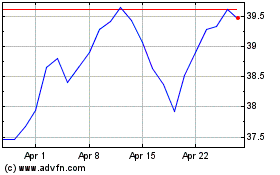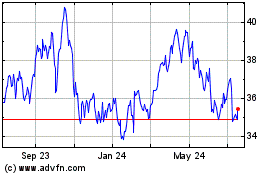Trump Rollback of Methane Regulations Splits Energy Industry -- 2nd Update
August 29 2019 - 4:06PM
Dow Jones News
By Bradley Olson and Christopher M. Matthews
The Trump administration's move to roll back regulations on
methane has divided the energy industry, with large companies
saying restrictions are crucial to curtail leaks of the potent
greenhouse gas and smaller producers calling them too costly.
Many of the world's biggest energy companies expressed
disappointment with the Trump administration's decision to erase
rules that sought to limit leaks of methane from oil-and-gas
operations.
Energy giants such as Exxon Mobil Corp., Royal Dutch Shell PLC
and BP PLC have made big bets on producing natural gas and selling
it around the globe. Emissions of methane, the primary component of
natural gas, undermine their sales pitch that gas is a cleaner
fossil fuel.
"We have to reduce methane emissions for natural gas to realize
its full potential in our energy mix," said BP America Chairman and
President Susan Dio. "Simply, the more gas we keep in our pipes and
equipment, the more we can provide to the market -- and the faster
we can all move toward a lower-carbon future," she added.
But many independent oil-and-gas producers, such as billionaire
Harold Hamm, chief executive of Continental Resources Inc. and a
supporter of Mr. Trump, have opposed federal methane regulation.
The companies say the rules are unnecessary because the industry is
already taking voluntary actions and the costs of the federal
mandates would weigh heavily on smaller and midsize producers.
Some producers have also expressed concern that limits on
venting natural gas, as well as burning it, known as flaring, could
lead to a slowdown in oil output, since gas is often a byproduct of
oil production.
The American Petroleum Institute, an industry trade group,
pushed the Trump administration to roll back the Obama-era
requirements, which would force the industry to install equipment
that can better monitor and limit leaks from new drilling activity,
as well as perform more frequent inspections.
The Independent Petroleum Producers of America endorsed the
Trump administration's decision, noting that companies would still
be subject to regulation of traditional pollution sources from
oil-and-gas facilities.
"However, the hundreds of thousands of existing, small
business-owned low-production wells wouldn't be subject to
inappropriate regulations that arise from a methane rule triggered
by a little-understood section of the Clean Air Act," said IPAA
Executive Vice President Lee Fuller.
For smaller companies, particularly those operating older,
low-producing wells, the cost of the regulations would be
significant, Mr. Fuller said. An average, low-producing natural gas
well in Pennsylvania might earn only $9 a day, after expenses, he
said. The IPAA estimates the regulatory cost for such a well could
be as much as $10 a day.
The proposed plan to do away with the rules is likely to set off
a prolonged legal battle as environmental groups take steps to
oppose the action, further delaying potential rules.
Many large oil-and-gas producers say they now support federal
methane regulation, and are also increasingly vowing to voluntarily
reduce their emissions, which come from intentional discharges as
well as from leaks at well sites, pipelines and storage facilities.
Chevron Corp., Exxon, BP and Shell are among the companies that
have set targets for reducing emissions. Some companies have even
made the goals a part of executive compensation packages
In the U.S. alone, methane that leaks or is released from
oil-and-gas operations annually is equivalent to the greenhouse gas
emissions of more than 69 million cars, according to a Wall Street
Journal analysis.
Some large companies said they would continue to advocate for
regulations. An Exxon spokesman noted that the company had
announced support for direct regulation of methane emissions last
year and said it would urge the Environmental Protection Agency to
retain the main features of the existing rule.
"Shell has long supported the direct regulation of methane when
regulation is efficient, effective and encourages innovation," said
Shell U.S. President Gretchen Watkins. "We believe sound
environmental policies are foundational to the vital role natural
gas can play in the energy transition and have made clear our
support of 2016 law to regulate methane."
Write to Bradley Olson at Bradley.Olson@wsj.com and Christopher
M. Matthews at christopher.matthews@wsj.com
(END) Dow Jones Newswires
August 29, 2019 15:51 ET (19:51 GMT)
Copyright (c) 2019 Dow Jones & Company, Inc.
BP (NYSE:BP)
Historical Stock Chart
From Mar 2024 to Apr 2024

BP (NYSE:BP)
Historical Stock Chart
From Apr 2023 to Apr 2024
